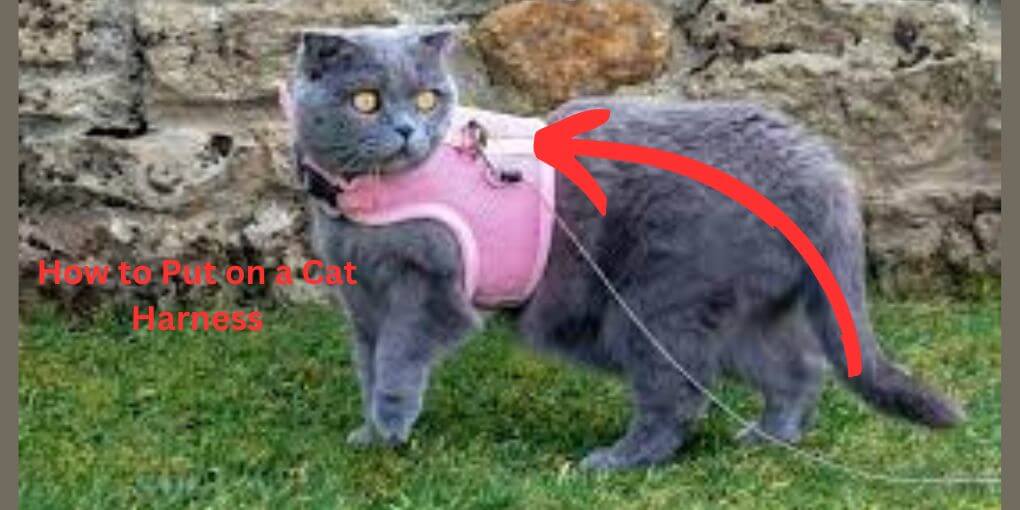
Not only does it keep your kitty safe and secure, but it also lets them explore the great outdoors in style!
But let’s be honest, putting on a cat harness can be a bit of a challenge, especially if your cat is not used to it.
Don’t worry, though – we’ve got you covered with this step-by-step guide on how to put on a cat harness like a pro!
First off, it’s important to note that getting a cat used to wearing a harness takes time and patience.
You can’t just slap it on and expect your cat to love it right away. But with some training and a few treats, your kitty will be strutting their stuff in no time.
In this guide, we’ll walk you through everything you need to know about putting on a cat harness, from choosing the right size to adjusting the fit to getting your cat used to wearing it.
So grab your kitty, and some treats, and let’s get started on this awesome adventure!
Why harnessing your cat is important
If you’re a cat lover, you know that cats are curious creatures who love to explore their surroundings.
However, letting your cat roam free outside can be dangerous and even life-threatening. Cats can easily get lost, injured, or even attacked by other animals.
That’s where a cat harness comes in handy. Not only does it keep your cat safe, but it also allows them to experience the great outdoors in a controlled and supervised manner.
Harnessing your cat is also a great way to bond with them and provide them with much-needed exercise.
It’s a fun activity that you and your furry friend can enjoy together, and it can even help reduce your cat’s anxiety and stress levels.
If your cat is an indoor-only cat, harnessing them gives them a chance to experience new sights, sounds, and smells that they wouldn’t otherwise have access to.
Overall, harnessing your cat is an important aspect of responsible pet ownership.
It keeps them safe, provides them with exercise and mental stimulation, and strengthens the bond between you and your feline friend.
So don’t be afraid to give it a try—your cat will thank you for it!
Different types of cat harnesses
When it comes to cat harnesses, there are a few different types to choose from, each with its own advantages and disadvantages. Here’s a rundown of the most common types:
H-shape harness
This type of harness has a strap that goes around the cat’s neck and another that goes around the chest, forming an H-shape.
It’s easy to put on and adjust, and it provides good support for the cat’s body.
Figure-eight harness
This harness is shaped like a figure-eight and goes around the cat’s neck and chest. It’s a good choice for cats who tend to wriggle out of other harnesses, as it’s more difficult for them to slip out of.
Vest harness
This type of harness is like a little vest that goes over the cat’s head and has straps that go around the chest and belly.
It’s a good choice for cats who are sensitive to pressure on their necks, as the weight is distributed evenly over the body.
Jacket harness
Similar to a vest harness, a jacket harness covers more of the cat’s body, including its back and sides. It’s a good choice for colder weather and can provide a bit of extra warmth and protection.
Benefits of harnessing
If you’re still on the fence about harnessing your cat, here are a few benefits to consider:
Safety
Harnessing your cat keeps them safe while they explore the great outdoors.
You can keep them away from dangerous areas and supervise them closely to ensure they don’t get into any trouble.
Exercise
Harnessing your cat is a great way to provide them with much-needed exercise.
Walking or playing with your cat outside can help them burn off excess energy and maintain a healthy weight.
Mental stimulation
Cats are curious creatures who love to explore new environments. Harnessing them gives them the opportunity to experience new sights, smells, and sounds, which can help keep them mentally stimulated and prevent boredom.
Bonding
Spending time outside with your cat can help strengthen your bond and build trust between you and your furry friend. It’s also a great way to create fun and lasting memories together.
Confidence
For shy or anxious cats, harnessing can be a great way to boost their confidence.
As they become more comfortable with the harness and the outdoor environment, they may become more outgoing and adventurous.
Choosing the Right Harness
Choosing the right harness is essential to ensuring your cat’s safety, comfort, and enjoyment. Here are some tips to help you choose the right harness for your furry friend:
Consider the size and shape of your cat
Cats come in all shapes and sizes, so it’s important to choose a harness that fits your cat properly.
Measure your cat’s neck and chest to ensure you get the right size, and consider the shape of your cat’s body when choosing a harness style.
Think about your cat’s personality
Some cats are more comfortable with certain harness styles than others. Consider your cat’s personality and comfort level when choosing a harness.
If your cat tends to be skittish or easily spooked, a vest harness that covers more of its body may be a better choice than an H-shaped harness.
Look for safety features
Choosing a harness should always be based on safety. Look for harnesses with secure buckles, sturdy materials, and reflective stitching or materials for increased visibility at night.
Consider the activities you plan to do
If you plan to take your cat on long walks or hikes, a harness with a handle on the back may be helpful for picking up and carrying your cat if they get tired.
If you plan to do water activities with your cat, a harness made of quick-drying materials may be a good choice.
Don’t be afraid to try different harnessess
If the first harness you try doesn’t work out, don’t give up! Cats can be picky about their harnesses, so it may take a few tries to find the right one.
Keep trying until you find a harness that fits well, is comfortable for your cat, and meets your safety needs.
Choosing the right harness may take a bit of time and effort, but it’s worth it to ensure your cat’s safety and comfort while exploring the great outdoors.
Step-by-Step Instructions on Putting on the Harness
Putting on a cat harness may seem daunting, but with a little patience and practice, you’ll be able to get your furry friend ready for their outdoor adventures in no time. Here are the step-by-step instructions for putting on a cat harness:
- Before putting on the harness, let your cat sniff it and get used to its presence. This will help them feel more comfortable when it’s time to put it on.
- Adjust the harness to the appropriate size for your cat, making sure it’s not too tight or too loose. The harness should fit snugly but not be restrictive.
- Hold the harness open and slide it over your cat’s head. Be gentle, and make sure your cat’s ears are not folded or caught in the harness.
- Once the harness is over your cat’s head, adjust the straps around your cat’s neck and chest to ensure a comfortable fit. The harness should be snug but not tight, and you should be able to fit two fingers between the harness and your cat’s body.
- Fasten the harness’s buckles and make sure they’re properly secured. Double-check that the harness is not too tight or too loose.
- Once the harness is secured, attach the leash to the harness’s D-ring. Give the leash a gentle tug to make sure it’s securely attached.
- Observe your cat’s behavior while they’re wearing the harness. If they seem uncomfortable or distressed, remove the harness and try adjusting it again.
Getting Your Cat Used to the Harness
Getting your cat used to wearing a harness may take some time and patience, but it’s an important step to ensure your cat’s comfort and enjoyment during outdoor activities. Here are some tips to help your cat adjust to wearing a harness:
Start with short sessions
When you first introduce your cat to the harness, start with short sessions of just a few minutes at a time.
Gradually increase the duration of the sessions as your cat becomes more comfortable.
Use positive reinforcement
Give your cat plenty of treats, praise, and affection while they’re wearing the harness. This will enable kids to connect the harness with satisfying memories.
Let your cat lead the way
Follow your cat’s lead during the harness training process. If they seem hesitant or uncomfortable, give them some space and try again later.
Take it slow
Don’t rush the process of getting your cat used to the harness. Let them explore and get used to the sensation of wearing it at their own pace.
Practice indoors first
Practice putting the harness on and taking it off indoors before venturing outside.
This will help your cat associate the harness with familiar surroundings.
Be patient
Remember that every cat is different, and it may take some time for your furry friend to get used to wearing a harness.
Be patient and keep trying, and soon your cat will be comfortable and confident in their new gear.
Conclusion
Harnessing your cat can open up a whole new world of outdoor adventures and enrich your cat’s life in countless ways.
By choosing the right harness, taking the time to get your cat used to wearing it, and following the proper steps for putting it on.
You can help your furry friend stay safe and comfortable while exploring the great outdoors.
Remember to always supervise your cat while they’re wearing a harness and to be patient and positive during the training process.
With practice and plenty of love, you and your cat can enjoy all the fun and excitement that comes with harnessing!

Patricia White is a pet enthusiast. With 10 years of experience in the pet industry, she brings a wealth of knowledge and expertise to MeToPet. She is honored to be a part of the MTP team and is dedicated to sharing her passion for pets with our readers.









